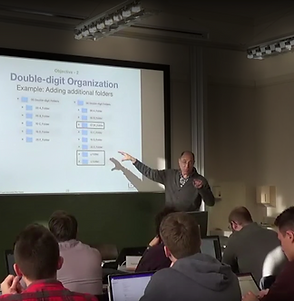Save People Time by 20-30%
LEAN INFORMATION is an information services consultancy that helps organizations use actionable information consistently. Customers achieve the results they want from their information and build a reputation for quality information.

-
Lean information is based on the four intrinsic attributes of data quality. (Inspired by: Huang, K.-T.; Lee, Y.W.; Wang, R., Quality Information and Knowledge, Prentice Hall, 1999, p. 40)
-
Information is lean when it is free of waste for its audience.
-
Poor quality or wasteful information consumes time and money. It can also be a risk.
© 2014-2025 www.leaninformation.com. All rights reserved. Terms and Conditions
Our Solutions
Organizations often invest heavily in information management but neglect quality – despite its intrinsic value to improve results.
Consulting
Would you like a consultation?
Our consulting services introduce the principles of lean information. They help you define your improvement priorities aligned with your business objectives.
Coaching
Who would you like us to coach?
Those who, at times, create wasteful information must want it to be lean. Coaching provides the guidance and insight to help them achieve their desired future state.
Training
Which skills are your priorities?
Your employees already have many basic skills to make information lean. From onboarding to just-in-time learning, additional lean thinking enables them to improve quickly.
Transferable Skills
Lean information skills are based on universal, technology-independent principles from information science and data quality to lean management. The skills are transferable, applicable to all information in all languages.
Lean information is free of waste for its audience. Information is wasteful, consuming time and money, when it is meaningless, ambiguous, incorrect, and incomplete. Information is lean for its audience when it is:
Relevant
Define the information needed and keep it plain.
Specific
Ensure that it is well named, structured, designed,
Correct
... verified, and governed.
Complete
Make it inclusive, contextualized, and transferable.
Measurable Results
Lean information is not simply less information. It is the minimum needed by its audience to understand and act. Here are a few examples of quantitative and qualitative metrics. Time is money, and life.
Sales proposal submitted
30%
Less text than the original
Company newsletter
to 1800 employees
150hours
Saved per month
Sales proposal accepted
9.3 million USD
+ Customer lifetime value
Better decisions with lean information
Know
-what, -how, -why, -what if
Capabilities
All organizations can benefit from lean information, including those in information-intensive industries. Here are four areas where capabilities are built:
Excellent Data
Lean information helps build a culture of data quality and AI readiness:
-
It uses a common vocabulary between Business and IT, and within teams
-
Roughly 60-80% of most organization’s data is internally generated
-
Employees skilled in lean information and information stewardship reduce the need for data cleaning and preprocessing, improving analytics and AI applications
Leaner Processes
'Information' is the forgotten ninth waste of Lean:
-
There is waste in processes and in the information that drives them
-
Lean's Value Stream Mapping does not consider information quality
-
Wasteful information affects all of Lean's recognized 'eight wastes': defects, excess processing, overproduction, waiting, inventory, transportation, movement, and non-utilized talent.
Loyal Customers
Sales and service teams that communicate effectively are more successful:
-
Customers want their information from your organization to be lean
-
Customer relationships deepen from their feedback on your quality
-
Consistently delivering lean information is a competitive advantage
Healthy Workplaces
Structured lean thinking enhances employees' natural intelligence:
-
Sources and symptoms of information overload are eliminated
-
Employees have less interruptions and can more easily stay in their flow
-
HR Performance Management uses lean information to improve employee competencies: analytical, collaborative, communicative, customer-focused, influential, information steward, innovative, organized, relationship-builder, strategic, trustworthy
Team
Team members are professionals sharing a common interest in helping organizations succeed using lean information. Their expertise includes business process design, information governance, information science, lean management, library science, and plain language.
Ron Hyams, Principal and Founder of Lean Information
Ron Hyams developed Lean Information while improving information quality in organizations.
Ron holds an Executive MBA from the University of
St. Gallen's Institute for Media and Communication Management. His scientific paper, Information Quality in Complex Sales, was published by the International Conference on Information Quality, MIT.
Ron’s industry experience includes re/insurance, pharma, specialty chemicals, media, and technology. His functional experience includes sales, information management, governance, and quality. In IT, Ron sold and managed the customization of information management platforms.
Throughout his career, he has witnessed first-hand the relationship between information quality and success. Technology is important and so are the basics. Make your information lean from the start. (LinkedIn profile)

Workshops & Talks
Brussels Plain Language Experience, November 2025
Plain Language and Lean Information, How to build information quality cultures in AI-driven organizations
Int'l Conference on Knowledge Management, October 2024
World Information Architecture Day, March 2024
Swiss Knowledge Management Forum, March 2024
Le Congrès SMP (Société suisse de Mgmt de Projet), April 2024

Published work
"Lean Information – Eliminating information waste," June 2024
"Information Quality in Complex Sales," October 2004

Testimonials
Information literacy solves immediate needs and builds future competence. This added value may not be realized until after our work is finished.
"... one of the most appreciated lectures in my program.
... received positive feedback long after..."
Dr. Pavel Kraus, Lecturer, Zurich University of Applied Science
"We began by coaching lean information skills for our communication team, specifically to improve our newsletter. Now, I'd like others to have these additional skills."
Perry Perlmutter, President & CEO,
Services for the Underserved, Inc.
"Our facilities manager used lean information to structure his communication more effectively. This benefited everyone."
Markus Gasser, Past Deputy Head, City of Bern Sports Department
Contact Us







